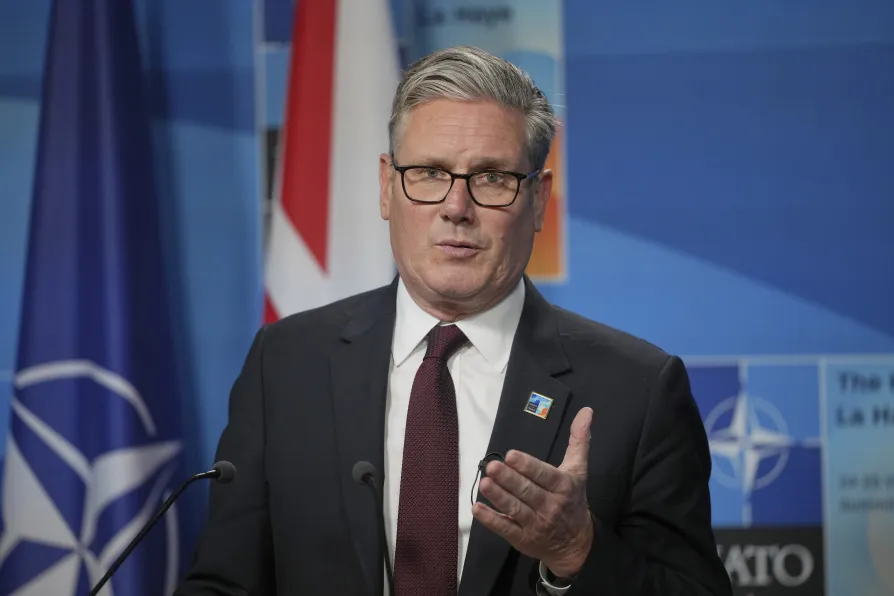
 Prime Minister Keir Starmer speaks during a media conference at the end of the Nato Summit at the Hague, Netherlands, June 25, 2025
Prime Minister Keir Starmer speaks during a media conference at the end of the Nato Summit at the Hague, Netherlands, June 25, 2025
IMAGINE a scenario in which any one of Israel’s regional adversaries were to to assassinate the zionist state’s top governmental, military, scientific and intelligence figures.
We could anticipate the media storm of outrage, the menacing words from the leaders of Israel’s Nato allies, the instant bombardment from the vast armada of the US navy situated in the eastern Mediterranean. The skies over Cyprus would be darkened by repeated RAF sorties flying from the Akrotori basesimposed on this former British colonial possession.
From East Anglia US bombers would take off from “RAF” airfields, to be refuelled by Nato before dropping their ordnance on yet more unfortunates.
But when Israel conducts such an operation the political Establishment permits itself a few carefully chosen words urging restraint and de-escalation inflected with just enough comment by military and intelligence professionals to convey admiration at the skill and determination of their opposite numbers in the Israeli apparatus.
Such are the double standards that populate the dominant media and political narratives in the imperial alliance.
Save when recently the BBC carried reports of Gaza casualties without the obligatory description of the sources as the “Hamas-run” Health Ministry it highlighted the pervasive character of the thought-police regime that has so outraged the BBC’s own journalists.
A million people took to the streets in Tehran to mourn the those killed by the combined Israeli, US and British operation.
The idea that targeting the state, military, scientific and intelligence leaders of a state, however divided it people are along political lines, will result in regime change fits the mindset of our imperial elite, who think and act as if “the people” of every country are their playthings.
If a foreign state assassinated our prime minister, the heads of MI5, MI6 and GCHQ, our scientific leaders in nuclear engineering and the chiefs of the General Staff while killing dozens in a gratuitous attack on, say, Wandsworth prison, our response would be national unity to defend our sovereignty.
No matter. However desperately unpopular is Keir Starmer and how bloodstained are the hands of our military and intelligence chieftains, holding them to justice is our responsibility and ours alone.
Similarly, no matter how reactionary might be the Iranian regime there is no more political or moral justification for imperial missions of regime change than there is for the illegal acquisition of energy sources, raw materials or precious earths. Sovereignty rests not only in every state but in the people of every country.
When, in 1881, British imperialism was seeking to annex Egypt and Sudan, the Sudanese leader Muhammad Ahmad bin Abd Allah led a revolt that resulted in the death of General Gordon, the commander of the invading British military. Subsequently, the imperial state responded with a technological superiority conferred by machine guns which resulted in 11,000 Sudanese dead — a massacre admittedly not quite on present-day scale established by Israel — for just 28 British casualties.
Britain’s socialist pioneers in the Socialist League, William Morris and Eleanor Marx, and backed by Engels, issued the first anti-imperialist manifesto which condemned an “unjust war.” They did so unconcerned by the the nature of the Mahdi’s social thinking or even of his regime but from the political principle that the sovereignty of peoples and the self-determination of nations trumped the ideology of imperialism.
As Starmer ramps up military spending to the imperial median it is worth noting that our socialist forebears wrote that a big part of the total surplus value generated by the British working class was “being squandered on Arab slaughtering.”
When today an increasingly unsustainable part of our national income is devoted to war, we can see the contours of political thought in the working-class movement taking a familiar shape.

From nuclear bomb storage in the 1950s to surveillance flights over Gaza today, the Cyprus base has enabled seven decades of machinations so heinous that Starmer once blurted out ‘we can’t tell the world’ what goes on there, writes NUVPREET KALRA

While David Lammy makes hollow criticisms, RAF Akrotiri conducts five-hour surveillance flights sending targeting data to Israel, reports ALFIE HOWIS











